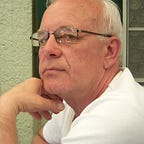On Readers and Critics
The Evolving Role of Critics in the Digital Age
As I passed by, I heard Barth say that the reader seeks pleasure and enjoyment from the text, while the critic aims to write about it later, claiming to understand what the author truly intended. In the distant past, during the era of literary giants like Goethe, Tolstoy, and others, critics took on the extraordinary task of unveiling the era and the author’s soul, often grasping the author’s intentions better than the authors themselves, and explaining it all to the people. In doing so, they instilled in readers a sacred awe for literary genius, guiding them on what to see and admire in those books.
Now, as the paper book quietly and steadily recedes into the past, finding its eternal resting place in library cemeteries, and the only open library for all becomes the Internet, readers suddenly find themselves stunned before the overwhelming ocean of old and new texts, in this case, the role of the critic, first and foremost, is pointing. Their task is to point a finger and say, “This is worth reading, but that is not; it’s mere scribbling.” Perhaps there is more to say critic, but only if someone asks. The main thing, the critic migrates to the Internet alongside the author and the reader.
How serious and enduring is the critic’s place in the online realm? Maybe soon, even here, there will be no need for critics, just as there is no longer a need for coachmen or lamplighters. In the boundless expanse of the Internet, texts will freely encounter their readers, who respond with joy or pain, but always with admiration and enthusiasm. These texts will be the key to the “little green door in the wall,” unlocking their own personal journey within the grand Book of Life. And for what then is this critic to the reader? They discover their own understanding of the text upon encountering it. Why do readers need to know what the author truly intended when the author has already expressed it within the text? And why do readers need to concern themselves with the author as a person, who is merely an abstract point designated by an address in the online realm, from where their text began its own journey?
Suddenly, we find ourselves living in a time when a new literary universe is born, where only texts and readers truly exist, freely wandering in anticipation of their encounters. And nothing more.
